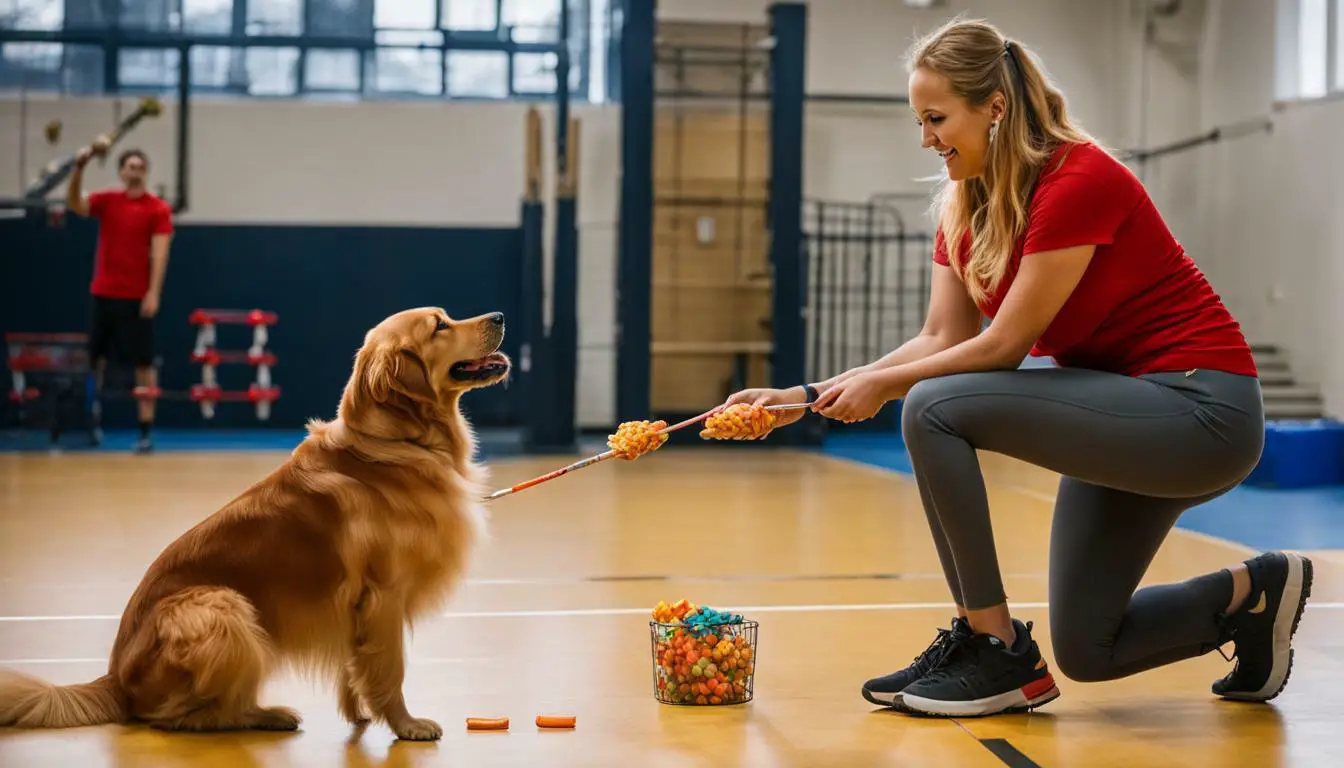Golden Retrievers are one of the most beloved dog breeds, known for their friendly demeanor and eager-to-please attitude. However, training them can be a daunting task, especially for first-time dog owners. But fear not, with the right techniques and patience, training your golden retriever can be a rewarding journey for both you and your furry friend.
Key Takeaways
- Training a golden retriever requires patience, consistency, and positive reinforcement
- Understanding your dog’s behavior is key to successful training
- Obedience training is crucial for a well-behaved golden retriever
- House training can be challenging, but with the right techniques, it can be achieved
- Building a strong bond through training is essential for a happy and healthy relationship with your dog
Understanding Golden Retriever Behavior
Before jumping into training your golden retriever, it is essential to understand their behavior. Golden retrievers are known for their friendly nature and intelligence, which makes them easy to train. However, like any other dog, they have their instincts and personality traits that require consideration.
One of the most prominent characteristics of golden retrievers is their love for people. They are social animals that thrive on human interaction and attention. This trait makes them excellent family pets and ideal companions for children. Golden retrievers are also known for their loyalty and devotion to their owners.
Golden retrievers have a strong hunting instinct, which can cause behavioral issues if not acknowledged. They love to chase and retrieve objects and may have a tendency to chew and destroy things around the house. However, this can be managed through proper training, exercise, and providing appropriate outlets for their energy.
It is essential to note that like many other dog breeds, golden retrievers can experience separation anxiety when left alone for extended periods. They may bark excessively, whine, or become destructive. Proper training, including crate training, can help alleviate these issues and teach them to feel comfortable in their own space even when their owner is away.
To ensure a successful training journey, it is crucial to understand your golden retriever’s natural instincts and personality traits. This knowledge will help you design training programs that are tailored to their specific needs and will make the training process more effective.
Golden Retriever Obedience Training
Teaching your golden retriever obedience is essential for a happy and well-behaved companion. Start with simple commands like “sit,” “stay,” and “come.” Use positive reinforcement techniques such as treats, praise, and affection to motivate your dog.
When teaching a command, use a consistent hand signal or verbal cue to help your golden retriever understand what you want. Repeat the command in a firm, but friendly tone until your dog performs the desired behavior.
Establishing boundaries is also crucial for obedience training. Use a leash to control your dog’s movements and prevent them from jumping, biting, or barking excessively. Consistently reinforce the rules and boundaries you set to ensure your golden retriever understands what is expected of them.
Training sessions should be short and frequent, lasting about 10-15 minutes each. Consistency is key when training a golden retriever, so make sure to train in the same location and use the same commands and cues every time.
Effective obedience training not only teaches commands but also builds a strong bond between you and your golden retriever. Positive reinforcement techniques help establish trust and deepen the relationship between you and your dog.
Remember, every dog is different and may respond differently to training techniques. If you encounter any challenges during obedience training, don’t hesitate to seek the help of a professional dog trainer.
House Training a Golden Retriever
House training a golden retriever can be a challenging but essential aspect of their training journey. It requires patience, consistency and a positive attitude. The use of crate training methods can be very helpful in this process. Here’s a step-by-step guide on how to effectively house train your golden retriever:
- Establish a routine: Set a consistent routine of feeding, exercise, and potty breaks. This will help your golden retriever understand when it’s time to go outside.
- Choose a designated spot: Pick a specific spot in your yard for your golden retriever to do their business. Take them to this spot every time they need to go.
- Use positive reinforcement: Reward your golden retriever every time they successfully go potty outside. This can be in the form of treats, praise or their favorite toy.
- Supervise closely: Keep a close eye on your golden retriever while they’re inside. Watch for signs that they need to go potty, such as sniffing or circling around.
- Use a crate: Crates can be an effective tool in house training. When you can’t supervise your golden retriever, keep them in their crate. Make sure it’s big enough for them to stand up and turn around comfortably but not too big to create a potty area. Dogs usually don’t like to soil their sleeping area.
- Accidents happen: Be prepared for accidents to happen. When they do occur, clean them up immediately with an enzymatic cleaner to eliminate any odor that could attract your golden retriever back to the same spot.
- Be patient: Every golden retriever learns at their own pace. Don’t get frustrated if it takes them longer than expected to understand the concept of house training. Stay positive and consistent with your training.
With consistency and patience, you can successfully house train your golden retriever and minimize accidents inside the house.
Building a Strong Bond through Training
Training your golden retriever isn’t just about teaching commands and correcting bad behavior; it’s also a powerful tool to build a lasting bond with your furry friend. By establishing trust, respect, and communication during training sessions, you can create a solid foundation for a healthy and happy relationship with your dog.
One effective way to build a strong bond with your golden retriever is through positive reinforcement. Rather than punishing your dog for misbehavior, focus on rewarding good behavior with treats, praise, and affection. This creates a positive association with training and helps your dog feel more confident and trusting around you.
When teaching commands to your golden retriever, it’s important to be patient and consistent. Start with simple commands such as “sit” and “stay” and gradually build up to more complex ones like “roll over” and “fetch.” Use clear and concise language, and avoid confusing your dog with too many commands at once.
Another effective way to bond with your golden retriever is through playtime. Choose activities that your dog enjoys, such as playing fetch or going for a walk, and use these opportunities to engage with your dog in a positive and fun way. This can help build trust and strengthen your relationship outside of training sessions.
Finally, it’s important to stay attuned to your golden retriever’s needs and personality. Every dog is unique, with their own set of likes and dislikes, fears, and quirks. By understanding your dog’s individual temperament and behavior, you can tailor your training approach to be more effective and enjoyable for both you and your dog.
Overcoming Training Challenges
Training a golden retriever can be a fulfilling experience, but it can also come with its fair share of challenges. Here are some practical solutions to overcome common training obstacles and ensure a successful training journey.
Patience is Key
One of the most important things to remember during training is to be patient with your golden retriever. Every dog learns at their own pace, and it is crucial to avoid becoming frustrated or angry when they don’t immediately understand a command or behave as expected. Instead, take a step back and reevaluate your training techniques, and try a different approach if necessary.
Consistency is Crucial
Another key factor in successful golden retriever training is consistency. Establishing a set routine for training sessions, positive reinforcement, and boundaries can help your dog learn and pick up new commands more quickly. Additionally, consistency between all family members and trainers is important to ensure your golden retriever does not become confused or overwhelmed.
Focus on Positive Reinforcement
Positive reinforcement is a highly effective training technique that involves rewarding your golden retriever for good behavior. This can be done through verbal praise, treats, or toys. However, it is important to avoid using physical punishment or negative reinforcement as this can be harmful to your dog and negatively impact their behavior.
Be Prepared for Environmental Distractions
Training takes place in various environments like your home, the park, and other public places. Your golden retriever will encounter many distractions in these settings, from other dogs to loud noises. It is important to be prepared and have patience when these distractions occur, and continue to use positive reinforcement techniques to keep them focused on the task at hand.
Seek Professional Help if Necessary
If you are struggling with any aspect of golden retriever training despite your best efforts, consider seeking help from a professional dog trainer. A professional trainer can provide additional resources, techniques, and personalized guidance for your specific training needs.
By keeping these training tips and techniques in mind, you can successfully train your golden retriever and establish a strong bond with them.
Conclusion
In conclusion, training a golden retriever can be a challenging experience, but it is ultimately rewarding for both you and your furry companion. Throughout this article, we have explored various tips and techniques for effective golden retriever training.
It is important to understand your golden retriever’s behavior and tailor your training approach to their personality. Obedience training is crucial for a well-behaved golden retriever, and house training can be achieved through consistent positive reinforcement and crate training.
During training sessions, it is essential to establish a strong bond with your golden retriever through positive reinforcement and teaching commands. Challenges may arise during the training journey, but with patience, consistency, and practical solutions, they can be overcome.
To summarize, always approach training with a positive attitude and consistency. Be patient and understanding, and remember to reward good behavior with praise and treats. With these golden retriever training tips in mind, you and your furry best friend will have a successful and enjoyable training experience.
FAQ
How long does it take to train a golden retriever?
The time it takes to train a golden retriever can vary depending on the dog’s individual temperament and the consistency of training. In general, it can take anywhere from a few weeks to several months to fully train a golden retriever.
What are the most important commands to teach a golden retriever?
Some of the essential commands to teach a golden retriever include sit, stay, come, down, and leave it. These commands help establish basic obedience and ensure the safety and well-being of your dog.
How do I potty train my golden retriever?
Potty training a golden retriever requires patience, consistency, and positive reinforcement. Establish a regular potty schedule, reward your dog for going in the designated area, and clean up accidents promptly to prevent future incidents.
Can I train a golden retriever without using treats?
While treats can be a useful tool for training, it is possible to train a golden retriever without relying solely on treats. Incorporating praise, play, and other forms of positive reinforcement can be just as effective in motivating your dog.
How do I address behavioral issues during training?
It is important to address behavioral issues promptly during training to prevent them from becoming ingrained habits. Consult with a professional dog trainer or behaviorist for guidance on specific issues and implement appropriate training techniques to correct unwanted behaviors.
What should I do if my golden retriever refuses to obey commands?
If your golden retriever is not responding to commands, it may be necessary to reassess your training methods and make adjustments. Ensure that you are using clear, consistent cues and providing proper motivation and reinforcement. Seeking guidance from a professional trainer can also be helpful in troubleshooting obedience issues.
How often should I train my golden retriever?
Training sessions should be conducted regularly, but the duration and frequency will depend on the age and attention span of your golden retriever. Short, focused training sessions of around 10-15 minutes a few times a day are generally more effective than longer, sporadic sessions.





